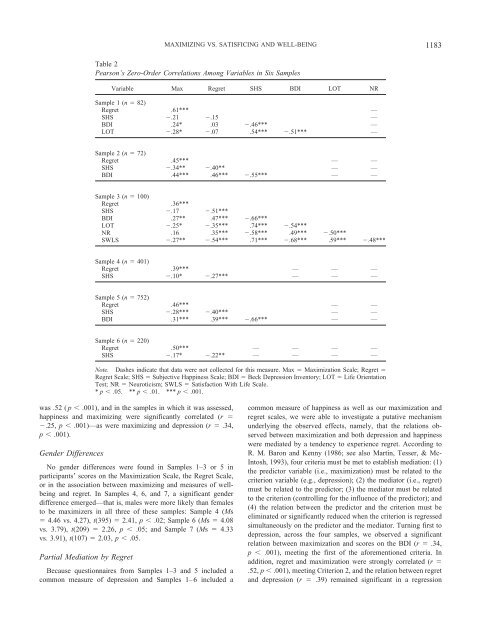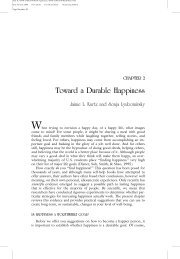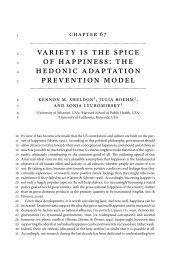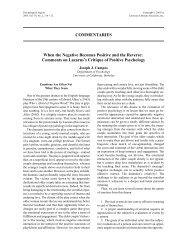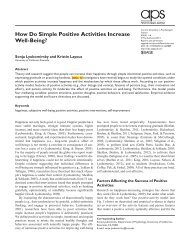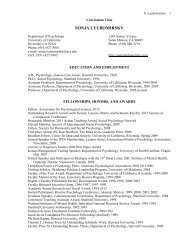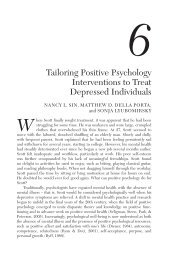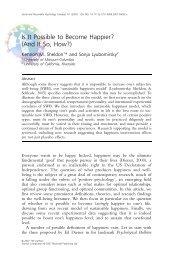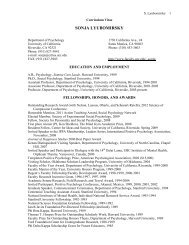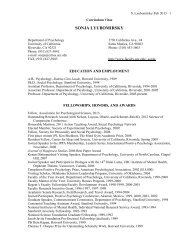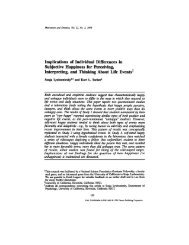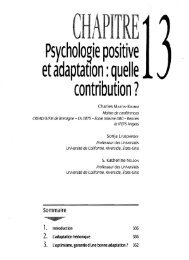Maximizing Versus Satisficing: Happiness Is a Matter of Choice
Maximizing Versus Satisficing: Happiness Is a Matter of Choice
Maximizing Versus Satisficing: Happiness Is a Matter of Choice
Create successful ePaper yourself
Turn your PDF publications into a flip-book with our unique Google optimized e-Paper software.
MAXIMIZING VS. SATISFICING AND WELL-BEING<br />
1183<br />
Table 2<br />
Pearson’s Zero-Order Correlations Among Variables in Six Samples<br />
Variable Max Regret SHS BDI LOT NR<br />
Sample 1 (n 82)<br />
Regret .61*** —<br />
SHS .21 .15 —<br />
BDI .24* .03 .46*** —<br />
LOT .28* .07 .54*** .51*** —<br />
Sample 2 (n 72)<br />
Regret .45*** — —<br />
SHS .34** .40** — —<br />
BDI .44*** .46*** .55*** — —<br />
Sample 3 (n 100)<br />
Regret .36***<br />
SHS .17 .51***<br />
BDI .27** .47*** .66***<br />
LOT .25* .35*** .74*** .54***<br />
NR .16 .35*** .58*** .49*** .50***<br />
SWLS .27** .54*** .71*** .68*** .59*** .48***<br />
Sample 4 (n 401)<br />
Regret .39*** — — —<br />
SHS .10* .27*** — — —<br />
Sample 5 (n 752)<br />
Regret .46*** — —<br />
SHS .28*** .40*** — —<br />
BDI .31*** .39*** .66*** — —<br />
Sample 6 (n 220)<br />
Regret .50*** — — — —<br />
SHS .17* .22** — — — —<br />
Note. Dashes indicate that data were not collected for this measure. Max Maximization Scale; Regret <br />
Regret Scale; SHS Subjective <strong>Happiness</strong> Scale; BDI Beck Depression Inventory; LOT Life Orientation<br />
Test; NR Neuroticism; SWLS Satisfaction With Life Scale.<br />
* p .05. ** p .01. *** p .001.<br />
was .52 ( p .001), and in the samples in which it was assessed,<br />
happiness and maximizing were significantly correlated (r <br />
.25, p .001)—as were maximizing and depression (r .34,<br />
p .001).<br />
Gender Differences<br />
No gender differences were found in Samples 1–3 or 5 in<br />
participants’ scores on the Maximization Scale, the Regret Scale,<br />
or in the association between maximizing and measures <strong>of</strong> wellbeing<br />
and regret. In Samples 4, 6, and 7, a significant gender<br />
difference emerged—that is, males were more likely than females<br />
to be maximizers in all three <strong>of</strong> these samples: Sample 4 (Ms<br />
4.46 vs. 4.27), t(395) 2.41, p .02; Sample 6 (Ms 4.08<br />
vs. 3.79), t(209) 2.26, p .05; and Sample 7 (Ms 4.33<br />
vs. 3.91), t(107) 2.03, p .05.<br />
Partial Mediation by Regret<br />
Because questionnaires from Samples 1–3 and 5 included a<br />
common measure <strong>of</strong> depression and Samples 1–6 included a<br />
common measure <strong>of</strong> happiness as well as our maximization and<br />
regret scales, we were able to investigate a putative mechanism<br />
underlying the observed effects, namely, that the relations observed<br />
between maximization and both depression and happiness<br />
were mediated by a tendency to experience regret. According to<br />
R. M. Baron and Kenny (1986; see also Martin, Tesser, & Mc-<br />
Intosh, 1993), four criteria must be met to establish mediation: (1)<br />
the predictor variable (i.e., maximization) must be related to the<br />
criterion variable (e.g., depression); (2) the mediator (i.e., regret)<br />
must be related to the predictor; (3) the mediator must be related<br />
to the criterion (controlling for the influence <strong>of</strong> the predictor); and<br />
(4) the relation between the predictor and the criterion must be<br />
eliminated or significantly reduced when the criterion is regressed<br />
simultaneously on the predictor and the mediator. Turning first to<br />
depression, across the four samples, we observed a significant<br />
relation between maximization and scores on the BDI (r .34,<br />
p .001), meeting the first <strong>of</strong> the aforementioned criteria. In<br />
addition, regret and maximization were strongly correlated (r <br />
.52, p .001), meeting Criterion 2, and the relation between regret<br />
and depression (r .39) remained significant in a regression


